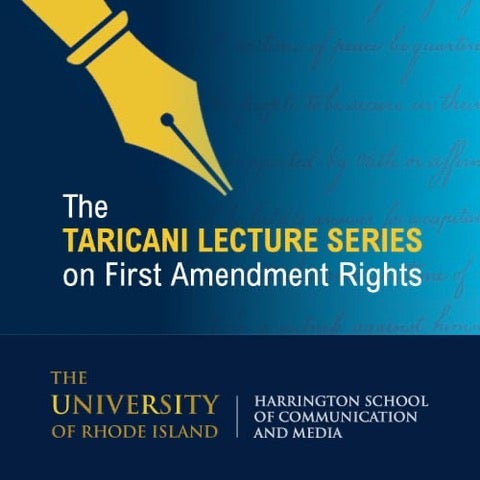KINGSTON, R.I. – Nov. 13, 2020 – A week after one of the most divisive and turbulent presidential elections in U.S. history, a half-dozen award-winning journalists gave the media mostly high marks for their performance during the election and explored how the confrontational political climate may challenge journalists in the future.
“I thought the coverage was remarkable,” said Dan Barry, twice a Pulitzer Prize finalist with The New York Times. “I’m obviously going to boost The New York Times’ coverage. Each day, [there was] a special section dedicated to the election and covering every nook and cranny in what’s been happing in this most extraordinary, protracted election.”
The virtual discussion, “Truth and Trust: Journalism Post-Election,” was the closing event in the Taricani Lecture Series on First Amendment Rights, hosted by the University of Rhode Island’s Harrington School of Communication and Media on Tuesday, Nov. 10. The series honors Jim Taricani H ’18, a nationally recognized investigative reporter for four decades with WJAR-TV who died in 2019. The final discussion fittingly featured five journalists who were colleagues and friends of Taricani – WJAR-TV investigative reporters Katie Davis and Parker Gavigan, former NBC 10 reporter Dyana Koelsch, retired Providence Journal political columnist M. Charles Bakst, and Barry, a 1994 Pulitzer Prize winner with The Journal.
While Barry praised media coverage and news outlets’ refusal to report allegations of election fraud without evidence, he found fault in the polling leading up to the election, which he said again missed important trends as it did in 2016.
“Polling did not recognize the inclination of people of Latino descent [to support President Donald Trump],” said Barry. “We missed how the people in Miami and how people in Imperial Valley in California felt and how the Trump campaign’s [labeling of] Democrats as socialists and communists found traction among people who had come from countries where there had been dictatorships or authoritarian governments.”
In contrast, Bakst felt the polls got it mostly right, hitting the mark on picking Democratic candidate Joe Biden as the winner and predicting he would carry key battleground states. “I think some of it was illusionary in that it took so long to count the votes because of the mail ballots,” Bakst said.
With the pandemic going on amid a presidential election, one vital job of the media was to deal with the sheer volume of information voters needed, Gavigan said. “More than a hundred thousand people in Rhode Island voted by mail. This was unprecedented,” he said. “It seemed like every day, every week, there were new directions we needed to inform the public about.”
Throughout the election and beyond, journalists faced and will face the challenge of restoring the trust of many in the public who have bought into accusations of fake news and attacks on journalist as enemies of the people.
“The news media are not the enemy of the people,” said Bakst. “We are the people. That’s how I used to do my job. I was a representative of the people. I must say that a lot of politicians didn’t appreciate it that way.”
Added Davis: “I always tell people that I pay taxes, as well. I’m a mom, too. I’m concerned about COVID and my kids going back to school. I share these concerns that you have. I’m a real person. I’m not a bot on Twitter posting fake news.”
Koelsch, who worked with Taricani on WJAR’s esteemed I-Team, said back then even when she and Taricani reported a story unfavorable to a politician, they were usually thanked for being fair. “I’m concerned that the public’s trust right now has diminished,” said Koelsch ’79, now owner and president of the public relations firm DK Communications. “Anecdotally from people that I know, [I hear] they blame the media for not reporting things positive to them. Their expectations seem to be, if you do a story that uncovers something, you are targeting folks.”
Davis added that she has seen that distrust from viewers who have asked WJAR to investigate alleged election fraud. “When you look into it, there’s not even the possibility of election fraud,” she said. “And sometimes they’ll say, well, you guys won’t investigate because you’ve been paid off. How crazy is that to think that we as local reporters in Rhode Island would have somehow been paid off by a national organization. It’s just kind of mind-blowing.”
In response to a question on the responsibility of journalists in educating the public about media literacy, Koelsch said it would be a good idea, but added, “The question I have is, is the public interested?”
Davis added that showing the process journalists use to fact-check stories and explaining the difference between news and social media could help.
“A lot of what we’ve done recently is showing our viewers the steps we’ve taken to vet stories and the steps we’ve taken to try to get their questions answered,” added Gavigan. “We’ve tried to do a better job of … showing the process and how this all works.”
“I think that journalists need to do more self-examination,” added Koelsch. “I think we all have to understand we have biases and nobody is totally unbiased. The first way to be unbiased in our reporting is to acknowledge that we have it and then fight against it.”
Those who missed the lecture can watch it on the Taricani Lecture Series website, along with the two previous lectures in this summer’s series. The series, hosted by the College of Arts and Sciences and the Harrington School, is endowed by Laurie White-Taricani ’81 and family and friends of Jim Taricani. The annual Taricani Lecture is scheduled to begin in spring 2021.
Please support the Taricani Lecture Series! Help us position the University of Rhode Island as a destination for robust discussion of journalism and the First Amendment by bringing distinguished local, national and international journalists to lend their expertise and perspective to this critically important topic.

